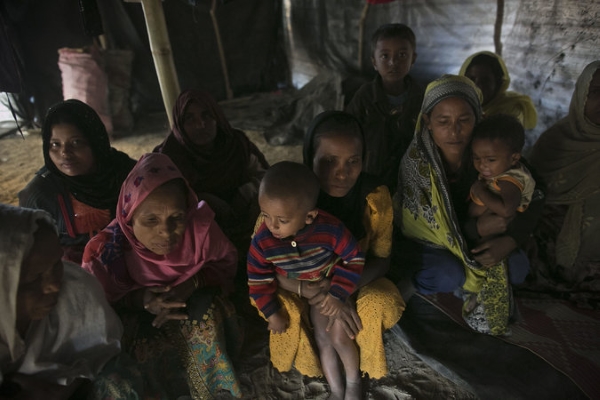
A group of women and children from one family at the refugee camp in Bangladesh in January, a week after they escaped an attack by the Burmese military.
https://www.youtube.com/watch?v=dKMv_YFaOfU
By: Katherine Gypson
Source: VOA News
Even before the U.S. State Department determines whether ongoing atrocities by Myanmar’s military against ethnic Rohingya Muslims qualify as ethnic cleansing, members of Congress are trying to pressure the country’s government to address the crisis.
Resolutions in the House and Senate condemn the violence and call on Myanmar leader Aung San Suu Kyi to speak out more forcefully on the issue.
Those measures are a first step in Congressional action that could eventually include a stand-alone bill leveling sanctions against the Myanmar military. But lawmakers such as Democratic Senator Richard Durbin say Myanmar, also known as Burma, must take action now.
“We don’t want to wait for passage of this resolution, as symbolic as it may be. We want results,” Durbin told VOA Contributor Greta Van Susteren. “We called on this government, called on Aung San Suu Kyi, to really step in, speak up and do something.”
Senator Durbin and several other Republican and Democratic lawmakers met with Myanmar’s ambassador this week and told him his country’s relationship with the U.S. depends on how it responds to the crisis.
Durbin said lawmakers want authorities to allow outside observers into the conflict areas, to hold soldiers responsible for committing atrocities, and to work with the U.N. refugee agency on resettling displaced Rohingya.
“If they will not allow third party observers into the area where the worst devastation, the worst suffering is taking place, with the Rohingya people, why in the world would we want to send the first American dollar to that country?” Durbin said.
It is still unclear how much support exists in the U.S. Congress for stronger measures.
Senate Majority Leader Mitch McConnell, a longtime supporter of democracy in Myanmar, cautioned against pressing its leader Aung San Suu Kyi forcefully on the issue.
“I don’t favor passing a resolution going after her,” McConnell said. “I think she’s the greatest hope we have to move Burma from where it has been – a military dictatorship — to where I hope it’s going.”
Senator Durbin also acknowledges that preserving ties with Myanmar’s military could help reform security forces that responded to August’s deadly attack by Rohingya militants with an overwhelming crackdown.
“If we want this military, now under a democracy, to understand what you do to respond to 16 deaths is not ethnic cleansing of 600,000 people. Perhaps military to military cooperation will help us reach that goal,” he said. “So I’m torn.”
Lobbying Congress for action
As Congress weighs action, lobbying groups are already pressing for new sanctions over the issue.
“We’ve been having some very productive conversations with members of Congress and senators’ offices and what we’re pushing for is for Congress and the administration to put sanctions on the Burmese army commander and also military businesses in Burma,” Simon Billenness, executive director of the International Campaign for the Rohingya, told VOA.
Billenness recently met with the U.S. State Department to push for those sanctions. He is hopeful the issue can overcome Washington’s partisan political battles.
“Burma is an issue that cuts across party lines and cuts across ideological lines,” he said.
One possible option before lawmakers is the re-instatement of the ban on the Burmese gem trade that was lifted last year by President Barack Obama. Billenness said Trump could issue an executive order reinstating those sanctions.
A move to curtail the Myanmar army’s funding would be key, said the Council on American Islamic Relations, the largest Muslim civil rights organization in the U.S.
“We would like to make sure that we do not provide any military assistance or military aid to the Myanmar military and also make sure that we do not engage in any financial exchanges, we don’t promote their products,” Amineh Safi, the government affairs coordinator for CAIR, told VOA.
Safi said there is concern the political atmosphere in the U.S. could limit attention on the crisis at a time when Congress is focused on domestic issues including healthcare and tax reform.
“There’s a lot going on internally in the United States that limits our ability to be engaged as we would in a different context or a different administration,” Safi said.
But one of the leading voices for human rights in the U.S. Congress, said the Trump administration is on the right track.
“We need to do more,” Rep. Chris Smith, a Republican from New Jersey told VOA. “The president and his team, Rex Tillerson, I think gets it and gets it well as to what’s actually happening. And we need to call it out and call it out strongly.”
Senator Durbin acknowledged that call will have global consequences for the United States’ standing abroad.
“Here is a Muslim population that is clearly being persecuted. And if we don’t stand up and speak up and do what we can, many Muslims around the world will read this the wrong way, in terms of our relationship with Muslims in the rest of the world.”
Katherine Gypson is a reporter for VOA’s News Center in Washington, D.C. Prior to joining VOA in 2013, Katherine produced documentary and public affairs programming in Afghanistan, Tunisia and Turkey. She also produced and co-wrote a 12-episode road-trip series for Pakistani television exploring the United States during the 2012 presidential election. She holds a Master’s degree in Journalism from American University. Follow her @kgyp



